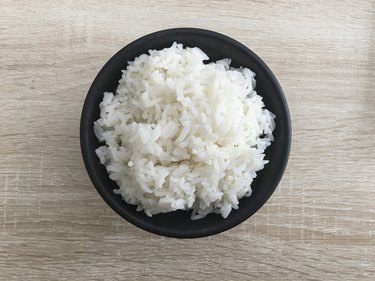
If you're looking for an alternative to your usual type of rice, consider jasmine rice. Native to Thailand, jasmine rice is a long grain rice a bit rounder and starchier, which makes it stickier, than other types of rice. Its popcorn flavor and jasmine aroma pairs well with seafood and dishes made with coconut. Like other types of rice, jasmine rice is low in fat, a good source of energy and can help you meet your daily iron needs.
Carbs in Jasmine Rice: A Source of Energy
Video of the Day
A 1/4-cup serving of uncooked jasmine rice, which makes 3/4 cups of cooked rice, has 160 calories. Most of those jasmine rice calories come from its carbohydrate content, which is 35 grams per 1/4-cup serving. Carbohydrates supply your body with energy, and not just your muscles, but your brain, nervous system and kidneys, too. Forty five to 65 percent of your daily calorie intake should come from carbohydrates.
Video of the Day
Make It Brown For Fiber
To increase the fiber benefits of jasmine rice, replace white jasmine rice with brown jasmine rice. A 1/4-cup of uncooked brown jasmine rice has 2 grams of fiber, while the white rice has none. Most Americans don't meet the daily requirements of fiber. Adult women need 25 grams a day and men need 38 grams a day; the average intake is just 15 grams. Fiber in food not only promotes bowel function, but it also improves blood lipid profiles and aids in blood sugar control.
A Little Protein and Very Little Fat
Jasmine rice contains some protein and very little fat. A 1/4-cup uncooked serving of jasmine rice contains 3 grams of protein. As a plant source of protein, jasmine rice does not contain all of the essential amino acids. There is a slight difference in fat content between the white and brown jasmine rice. The white rice is free of fat, while the brown rice has 1 gram of fat. As an intact grain, the brown rice retains its germ, which provides vitamins, minerals and unsaturated fat.
Get Some Iron
If you don't get enough iron in your diet you may be at risk of developing iron deficiency anemia, which is the most common nutritional problem worldwide, according to the Office of Dietary Supplements. Jasmine rice doesn't naturally contain a significant amount of iron, but some brands are fortified with iron to help you meet your needs. Unfortified jasmine rice meets 2 percent of the daily value, while fortified jasmine rice meets 8 percent.
Additional Mineral Content
Jasmine rice also contains limited, but measurable amounts of calcium (2 milligrams) and sodium (1 milligram). Note that this sodium content doesn't include any salt or other flavorings that you might add to the rice as you cook it.
Get Your B Vitamins
Along with iron, some brands of jasmine rice are fortified with B vitamins. These essential nutrients are necessary for helping transform the food you eat into energy. Some brands also act as a significant source of folic acid, meeting 20 percent of your daily value. Folic acid is a B vitamin most important for women of childbearing age because adequate intake helps prevent neural tube defects in babies.
- The Nibble: Rice Types
- Mahatma: Jasmine Rice
- Golden Star: Jasmine Rice
- McKinley Health Center: Macronutrients: The Importance of Carbohydrates, Protein and Fat
- U.S. Department of Agriculture: 2010 Dietary Guidelines for Americans: Chapter 4: Foods and Nutrients to Increase
- Harvard School of Public Health: Health Gains from Whole Grains
- Office of Dietary Supplements: Iron
- Medline Plus: B Vitamins
- Medline Plus: Folic Acid
- USDA Branded Food Products Database: Jasmine Rice